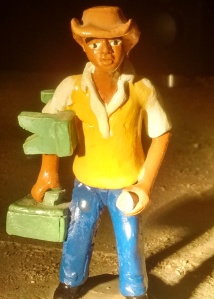[A Haitian shoeshine‘s story, continued from the previous post.]

His first stop after roaming along his own street was the orphanage, not because it was a likely spot to find customers, but simply because it was the nearest large building. Occasionally, the people who owned the orphanage would be there. Clean shoes lent them an air of credibility, or so they felt.
The shoeshine had come to know many of the children in the orphanage over the years. He’d even met some of their parents, whose inability to feed and house them had forced them to turn their little ones over to the care of this institution. The children were fed and housed, but whether they were truly cared for was another question, the answer to which saddened him.
He wondered how he would have handled the situation if his son had survived the quake but the boy’s mother had still perished. Could he have given up the only child he would ever have? Against his will, he had anyway. The memory of the little boy was so vivid, he swore he felt the child’s breath whenever a stealth breeze caught him by surprise. The man had never shed a tear for the boy since he died, although he remembered crying over him constantly while he was still with him. He cried as the boy slept, when he played, and when he sat on the roof of their home staring over the city, never knowing what thoughts passed through the child’s mind. Were they the same as his own? Where were those thoughts now?
No customers emerged from the orphanage so the shoeshine moved on.
His hopes for a good return from the mission house were high. He’d seen evidence of a team of young people from the US staying there. The Americans always carried plenty of cash. While he only charged his fellow Haitians a few gourdes, he could easily ask an American dollar for each pair of shoes from the blans. It was rare that their shoes actually needed cleaning, packed away as they had been in luggage few Haitians could afford. It was an unspoken agreement of a metaphysical transaction. They would give up what to them was worthless to clean not their footwear but their consciences.
His English was limited to the few expressions required to accomplish the deal. “One dollar.” “Two shoes.” “Thank you.” Few of the team members made an effort to expand communications, so he appreciated all that much more the ones who did. They would approach him with smiles and ask in their American accents, “Konben?” A few would actually try to bargain with him. While he went along with the game and didn’t begrudge them their amusement, it annoyed him all the same.
The teens had come to help build a school. He appreciated the Americans’ misguided attempts at assistance, but he’d known more than one construction worker who had lost their jobs to visiting American kids. Despite the fact that one Haitian worker could accomplish as much in an hour as a team of American youths could do in a day, they kept coming like some invading force, taking opportunity captive.
The house was alive with activity. Through the screened windows, the shoeshine saw the teens scurrying back and forth, exhibiting the same degree of purpose as that shown by the ants that crisscrossed the walls of the building with no apparent goal.
One white face glanced out from a hole in a wall and saw him. A young girl who couldn’t have been more than fifteen approached him. She held out a bag in her hand. With a shining smile, she told him, “Kado.” A conflict of fear and gratitude contorted his face as he took the gift. Looking inside, he saw a brand new tin of black polish. His smile of more gaps than teeth was sincere, but he couldn’t help thinking of the man he usually bought his polish from. This was one less bit of income his friend would receive. He felt bad, but wasn’t about to turn down this meager windfall.
Most of the kids just left their shoes on the steps with a dollar in one of them. A couple had bits of food, strange, colorfully wrapped bars of nuts and grains flecked with bits of chocolate. He would make the most of those scraps. One bar could be made to last for two meals if money or food were scarce, as they often were. There was no telling when the next team might arrive carrying more free goods.
